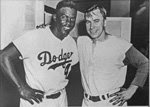Posted by Joan Rachlin, Executive DirectorI was a legal observer/poll watcher in a small New Hampshire town during last week’s election. Spending 12+ hours “protecting every person’s right to vote” got me thinking about the role of a “protector.” What does it mean to look out for the welfare of others in whatever context? IRBs and IACUCs fall into that “protector” category, and, given PRIM&R’s mission, we do too. In fact, as our 1980s era t-shirts and sweatshirts used to say, “we’re in the protection business!” In any case, that big chunk of time spent observing and “protecting” brought to mind one of my favorite stories and I’d like to share it with you. In addition to serving as a reminder of just how historic this past week was, it’s also a reminder of the many ways each of us can “cross someone to safety.” The below story is in quotes because this version was written by my friend, Steve Bloomfield. Read on…
“This story is partly about baseball’s greatest hero, Jackie Robinson, but the real the protagonist is Pee Wee Reese, the great Brooklyn Dodger shortstop. As all of you know, African-Americans were, for decades, prohibited from playing in the Major Leagues because of the color of their skin. Anyway, in 1947 it appeared that white America might just have grown up enough to accept African-American participation in the big leagues, and Branch Rickey, the Dodger’s manager, knew that the first man to break the color line would have to be a superb human being and a superb athlete, and he approached Jackie Robinson as that man.Now, Pee Wee Reese was a white man who had grown up in the segregated South, so one might make assumptions about Pee Wee’s predisposition toward people with a different skin color. While Jackie was tearing up the International League in preparation for his being signed by Brooklyn, six of the Dodgers circulated a petition among their teammates saying that they would refuse to play if Jackie was called up to the Majors. They handed the petition to Reese, confident that he would sign, but he didn’t. The petition failed and Dixie Walker, the perpetrator of that sad act, was later traded away, having proven to be a divisive force on the team.Jackie joined the Dodgers, and spent his best years at first and second base, complementing, rather than competing against, Pee Wee’s work at short. But, both on the field and from the dugout, Pee Wee saw the abuse that was heaped regularly on Jackie, including the catcalls from the stands, the bean balls at his head, and the death threats he received.One day in the 1947 season, the Dodgers were in Cincinnati playing the Reds. Crosley Field was an old-time ballpark, and the dugouts hugged the foul lines. The fans therefore sat very close to the diamond and the language flung toward Jackie that day when the Dodgers were in the field—from both fans and opposing players—was especially cruel. Pee Wee heard it and saw the pain it was causing Jackie, and so in the middle of the action he called a time out, walked across the infield to first base, gave Jackie some words of encouragement, and then he gently placed a hand on Jackie’s shoulder. It wasn’t that Jackie needed this gesture of support, as he was constantly proving that he could stand up for himself. But the opposing players needed to see it, and the fans needed to see it, too. Someone had to make a move, “crossing to safety,” as Robert Frost had named it in a poem. And Pee Wee had the courage to make that move.  Roger Kahn, author of The Boys of Summer, called Pee Wee’s gesture “baseball’s finest moment.” Indeed, in part because of that moment, Reese and Robinson came to personify the promise of integration in American life by showing to us the people we could become.” IRBs and IACUCs are in the “protection business,” and, in that capacity, each of you helps “cross subjects to safety” by “having the courage to make a move” when you see or hear something that does not feel ethical or scientifically responsible. Thank you for your commitment to this cause and for your work in general.Please feel free to share stories about named or anonymous “crossers” to safety that you’ve met, heard about, or personally been involved with.Speaking of “crossing others to safety,” it’s Veteran’s Day and we honor and thank the many women and men who have served, or are serving still, in the Armed Forces.
Roger Kahn, author of The Boys of Summer, called Pee Wee’s gesture “baseball’s finest moment.” Indeed, in part because of that moment, Reese and Robinson came to personify the promise of integration in American life by showing to us the people we could become.” IRBs and IACUCs are in the “protection business,” and, in that capacity, each of you helps “cross subjects to safety” by “having the courage to make a move” when you see or hear something that does not feel ethical or scientifically responsible. Thank you for your commitment to this cause and for your work in general.Please feel free to share stories about named or anonymous “crossers” to safety that you’ve met, heard about, or personally been involved with.Speaking of “crossing others to safety,” it’s Veteran’s Day and we honor and thank the many women and men who have served, or are serving still, in the Armed Forces.

No comments! Be the first commenter?